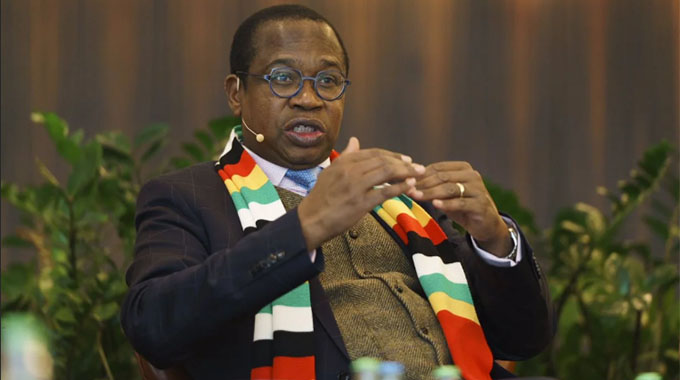Finance and Economic Development Minister Professor Mthuli Ncube says authorities have instituted measures that will ensure that the local currency will not suffer previous depredations, following the recent gazetting of Statutory Instrument 142 of 2019, which makes the Zimbabwe dollar the sole legal tender.
He said this when he appeared before the Parliamentary Portfolio Committee on Finance and Economic Development chaired by Felix Mhona.
Prof Ncube was also in the company of the ministry's secretary Mr George Guvamatanga and Reserve Bank Governor Dr John Mangudya.
Mhona said they invited the Minister to brief the committee on the SI 142 of 2019 on Reserve Bank of Zimbabwe legal tender regulations and mechanisms in place for its implementation.
The committee was also concerned that there was not much communication to the public, especially when it comes to explaining the instrument to people in the rural areas.
Concerns were raised that some of the people in the rural areas were being fleeced by unscrupulous people of their money due to lack of knowledge. Other members of the committee asked whether the RBZ would continue printing notes and if this would not induce inflation.
The legislators also queried if the fundamentals were in place for the reintroduction of the domestic currency. The trio explained the various tenets of the SI 142, its implications to individuals and corporates, and assured the concerned legislators that the country would not return to the 2008 era.
The committee also heard that already 55 bureaux de change were opened although 43 were operational. Dr Mangudya said they had received a number of applications last week.
Responding to questions from legislators on whether the country was not going to have a return of the same situation encountered in 2008, Prof Ncube said there has been a change of policies from those in 2008. Prof Ncube said the issue was not about the currency but the policies that supported a stable currency.
"There must be fiscal discipline and what we have at the moment is fiscal discipline of the highest quality and the results speak for themselves. We don't have a budget deficit, we have a surplus which we are deploying now to our social protection, and we will be increasing salaries for the civil servants and importation of food.
"The second fundamental is the monetary discipline in the form of managing the growth of money supply. The growth of money supply in the last few months has been flat because there was fiscal discipline which has been a problem in the first place.
"If you go back to 2008, it is the exact opposite. We had no fiscal discipline, we had no monetary sector discipline. The budget deficit was huge, rising and uncontrollable and was being monetised through the printing of money. We saw many zeros, we removed some and they came back. We do not have that at the moment, we have the right fundamentals to support the domestic currency," he said. He said Government was not repeating the 2008 policies.
"This is not 2008 where we had fiscal indiscipline and monetary sector indiscipline. We are far from that, the conditions are different, the policies are different. The policies are not being repeated. We are in a far better position than we were in back then. I assure you that we are not in 2008. We are re-engaging with the rest of the world," he said.
On the issue of informing the public, Prof Ncube said the Ministry had hired professionals to assist with communication who would soon start educating people on the new SI.
"When dealing with a currency, you do not call for a referendum especially in the face of a speculative attack which was going on. You move swiftly with decisiveness. This is how a sensitive issue has to be managed. But you have to give signals that it will happen at some point and we tried to do this. Now we need to explain in our indigenous languages especially in the rural areas," he said.
Dr Mangudya said appropriate policies, confidence and production were the most important fundamentals to support domestic currency.
"If you have a combination of right policies, confidence and there is production, the currency is strong. Any country's currency is influenced by those three fundamentals," he said.
He said it was important that the country produces enough food and stops importing.
"What we are missing in this country is that we are expecting the currency to take the role of production. Let's have production and as Zimbabwe, let's have confidence. We do not have confidence among ourselves as if we are all foreigners," he said.
On the printing of money, Dr Mangudya said it was meant to fill in the gap created by the removal of the foreign currency and also to replace worn out notes.
"We have removed usage of US dollars, there is a gap we have created in terms of paper money. There is a difference between paper money and currency. The currency in Zimbabwe is the Zim dollar represented by bond note, coins and RTGS.
"The $400 million, we feel there is need for an increase in paper money. As we print that money will be replacing the old money. Old notes should be replaced," he said.
- chronicle
 Concern over Masvingo black market
Concern over Masvingo black market  Kenya declares three days of mourning for Mugabe
Kenya declares three days of mourning for Mugabe  UK's Boris Johnson quits over Brexit stretegy
UK's Boris Johnson quits over Brexit stretegy  SecZim licences VFEX
SecZim licences VFEX  Zimbabwe abandons debt relief initiative
Zimbabwe abandons debt relief initiative  European Investment Bank warms up to Zimbabwe
European Investment Bank warms up to Zimbabwe  Young Investment Professional (YIP) Graduate Programme 2019
Young Investment Professional (YIP) Graduate Programme 2019 











 Young Investment Professional (YIP) Graduate Programme 2019
Young Investment Professional (YIP) Graduate Programme 2019
Editor's Pick